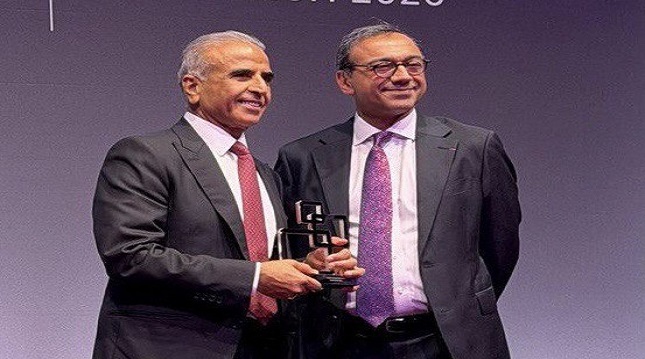Telecom
Why Government Should Encourage Telcos in Nigeria- Jane Egerton-Idehen

BY chukwuemeka fred agbata
There is no doubt that Nigeria has one of the largest Telecom markets in Africa as the sector attracts considerable foreign investment.
Over The Top Players, OTTPs, such as WhatsApp, BlackBerry Messenger, Telegram and many others, have significantly affected the average revenue per user of Telecom subscribers and this has adversely affected the overall revenue of the industry.
Questions that are begging for answers includes, ‘where does the industry go from here, having invested billions of dollars?’ ‘How does the Television compete with OTT players who have very little investments in overheads?’
I recently had a chat with Jane Egerton-Idehen, Country Manager, Avanti Satellite Communications and our discussion centered on her thoughts on the way forward for the Telecom industry in Nigeria.
Jane, who has been in the Telecom industry for a while now, thinks that the industry is currently at the threshold of an evolution, where it is about to enter into a transformation phase.
She observed that the growth of the industry is slowing down globally, with declining revenues, although the customers are becoming more savvy and aware in the face of technology that is daily becoming more sophisticated.
In terms of returns on investment, however, Jane thinks that it is not coming in as it should be. She also observed that, one good thing that is currently happening in the industry, is that, there is ample room for growth.
“It is also at a point where we are about to access a new layer of countries on the continent of Africa. Places that we haven’t been before”, she stated. She further observed that, all this while, the Telecom industry had concentrated in the cities, but now, gradually moving into the rural areas.
Jane is of the opinion that investors should be interested in investing in rural telephony because, that is the next phase where the billionaire subscribers will come from. “And that is where technology hasn’t really accessed untapped potentials”, she observed.
She, however, stressed that, for efficient return on investment, the infrastructures used in the cities cannot be used in the rural areas because, the cost model for rural areas has to be lower as the expected revenues from there will not be as much as we currently have in the cities.
“Yes, the technology in the sense of base stations or switches have to be the same, but how can we make the costs lower? How can we make them cheaper? How can we use lower cost models to access them? So, we really have to rethink all these”‘, she posited.
Government can compel investors to invest in the rural areas, through policies and regulations as well as complement the efforts of the investors, In Jane’s view, even though, they might be reluctant to do so because of the lower returns they are likely to get from there, coupled with the projected higher cost expected to be used in running the facilities in the rural areas.
To Jane, technology is capable of positively affecting the growth of the rural areas as this is where most of the Small and Medium Scale Enterprises, SME’s, are located, so, the government should be interested in this. She emphasised that the government can assist in facilitating the process for the investors in areas, such as site cost, customs clearance, swift right of way approvals, etc. She also suggested the use of Satellite KA band of a low cost model for accessibility in rural areas.
Jane believes that the OTT players are making a huge impact in the Telecom industry, even though, they are eroding the revenue accruing to the Telcos. In her opinion, therefore, players in the Telecom industry should be thinking about what to do about it, instead of whining about it.
In Jane’s view, we should take a look at relaxing some of our policies and regulations to encourage Telcos that have physical infrastructures, pay tax and are helping to reduce the unemployment in Nigeria by employing Nigerians to work in their companies. This is in contrast to OTT players who do not have or do these things in Nigeria but take a chunk of the revenues that would have accrued to the Telcos.
“We can demand for things, like they should have physical presence in the country. We can demand that they invest in certain sectors of our industry as a way to give back, for the kind of revenues they are making from our country”, she concluded, in respect of the foreign OTT players.
Telecom
Konga Launches ‘Berekete Sales’ with Up to 50% Discounts Across Major Categories

Nigeria’s leading composite e-commerce platform, Konga, has announced the launch of its highly anticipated Berekete Sales, a nationwide promotional campaign designed to deliver exceptional value to customers across key product categories.

Konga Berekete
The initiative reinforces Konga’s commitment to affordability, accessibility, and innovation while strengthening its position as a trusted retail partner for millions of Nigerians.
The Berekete Sales campaign features discounts of up to 50% on high-demand categories including Home and Kitchen, Computing, Electronics, Beauty, and Personal Care.
Carefully curated to meet both everyday and aspirational needs, the campaign comes at a strategic period that coincides with Ramadan, Lent, and the approaching Eid al-Fitr celebrations, seasons traditionally associated with reflection, generosity, and family-oriented spending.
Speaking on the campaign, Victor Olaleye, Konga Group Head of Marketing, emphasised that the Berekete Sales initiative reflects the company’s understanding of the economic climate and the importance of value-driven retail experiences. “Berekete Sales is about delivering abundance in savings to our customers,” he stated.
“We recognise that this period is significant for many households observing Ramadan and Lent, and we want to ensure they can access premium products at competitive prices.
“Our goal remains to make quality products accessible while maintaining the seamless shopping experience Konga is known for.”
Among the standout offers is a special deal on the Starlink Gen 3 kit, now available at ₦550,000, reduced from its regular price of ₦590,000.
As the authorised distributor, Konga continues to provide customers with reliable access to the high-speed satellite internet solution, further strengthening connectivity options in Nigeria.
Activation services are available in select cities, ensuring a smooth transition to enhanced internet performance.
In addition, technology enthusiasts can take advantage of an exclusive offer on the Huawei Watch 3, with a special promotion that allows customers to receive two units for the price of one at ₦200,000.
This offer underscores Konga’s strategy of delivering premium lifestyle products with unmatched value.
The Berekete Sales campaign also extends to computing solutions, with attractive deals on ASUS laptops, catering to professionals, students, and businesses seeking performance-driven devices at competitive prices.
Furthermore, customers can pre-order the new Samsung Galaxy S26 Ultra on Konga and receive gift items worth over ₦500,000 from Samsung, a compelling incentive for early adopters and technology enthusiasts.
By aligning its promotional calendar with key religious seasons, Konga demonstrates cultural awareness while providing practical solutions for customers during Ramadan, Lenten observances, and Eid celebrations.
The campaign ensures that households can upgrade their living spaces, enhance productivity, and invest in quality lifestyle products without straining their budgets.
Beyond the discounts, Konga’s integrated ecosystem, spanning secure payment solutions, nationwide logistics, and reliable customer support, ensures a seamless shopping journey from browsing to delivery.
This operational strength continues to differentiate the brand within Nigeria’s competitive e-commerce landscape.
As consumer expectations evolve, Konga remains focused on delivering not just products but complete retail experiences anchored on trust, transparency, and value. The Berekete Sales campaign is positioned to drive significant traffic, boost sales volumes, and deepen brand loyalty across its growing customer base.
With substantial savings, premium product offerings, and time-sensitive deals, the Berekete Sales As the campaign gains momentum, customers are encouraged to visit Konga.com or any Konga retail store nationwide to take advantage of these limited-time offers.
With its blend of spiritual season sensitivity and high-tech accessibility, Konga continues to set the pace for the future of commerce in Africa.
Telecom
Sunil Bharti Mittal Conferred GSMA Lifetime Achievement Award for Transforming Global Telecommunications

The GSMA has conferred a rare Lifetime Achievement Award on Sunil Bharti Mittal, Founder and Chairman of Bharti Enterprises, recognising his role in reshaping the global telecommunications landscape and expanding connectivity across operators, governments, businesses and billions of consumers worldwide.

Bestowed on only a handful of industry leaders in the GSMA’s history, the honour recognises contributions that have left an enduring and defining mark on the global communications ecosystem.
The award was presented at Mobile World Congress in Barcelona in the distinguished presence of His Majesty Felipe VI, the Prime Minister of Spain, Pedro Sanchez, the President of Catalonia, Salvador Illa, and global industry leaders.
A visionary in the telecom sector, Sunil Bharti Mittal has built Bharti Airtel into one of the world’s leading mobile operators, with operations across India and Africa, ranking among the top three globally and serving over half a billion customers.
He pioneered the expansion of mobile services across emerging markets and served as Chairman of the GSMA from 2017 to 2018, where he championed policies that encouraged investment and innovation while strengthening the industry’s commitment to connecting the unconnected and advancing digital inclusion.
He was previously honoured with the GSMA Chairman’s Award in 2008 and again in 2016 for his outstanding contribution to the growth and development of the global mobile industry and was felicitated at Mobile World Congress in February 2019 in recognition of his Chairmanship.
On receiving the award, Sunil Bharti Mittal said, “I am deeply honoured to receive this recognition and sincerely thank the GSMA for this award. I accept it not only as a personal milestone, but as a tribute to India’s telecom journey, the collective spirit of Bharti, and the rise of Indian telecom companies on the global stage.
Equally the award reflects the progress of an industry that has connected billions and belongs to the customers we serve, the teams who built our institutions, and the partners who believe in the transformative power of connectivity.
Telecommunication is a force that expands opportunity, places essential services in the palm of every individual and unlocks human potential. Helping shape its evolution into a powerful accelerator of modern progress has been a privileged responsibility. As innovation accelerates, we will continue to work with our partners & stakeholders to ensure that growth advances equity and creates lasting opportunity for generations to come.”
The Lifetime Achievement Award is a rare honour, bestowed only on select individuals whose leadership and innovation have left an enduring mark on the industry.
Telecom
House Probes Fintech Regulation via Public Hearing on New Commission Bill

House of Representatives is pushing to regulate Nigeria’s fintech sector through a public hearing on “A Bill for an Act to Establish the Nigerian Fintech Regulatory Commission and for Related Matters (HB.2389).”

Speaker Tajudeen Abbas opened the hearing, stressing the need for stakeholder inputs to craft enforceable, constitutional laws addressing regulatory overlaps in digital banking, science, technology, and communications.
Abbas highlighted fintech’s role in Nigeria’s growth via digital payments, blockchain, crowdfunding, and financial inclusion for the unbanked, creating jobs and supporting SMEs under President Tinubu’s Renewed Hope Agenda.
He warned that lagging regulations cause fragmentation, compliance issues, and investor uncertainty, necessitating a coordinating commission for licensing, supervision, standards, and a level playing field without duplicating bodies like the Central Bank of Nigeria (CBN), SEC, NITDA, or NDIC.
The commission would protect consumers, monitor cybersecurity, ensure data privacy, and promote education while complementing existing regulators.
Committee Chairman Emmanuel Ukpong-Udo, overseeing digital banking, banking regulations, science, technology, communications, capital markets, and institutions, called the bill vital for harmonizing oversight amid Nigeria’s rise as Africa’s fintech hub with 430+ firms valued at billions.
Ukpong-Udo emphasized balancing innovation, stability, and coordination to avoid burdens on startups.
Bill sponsor Fuad Kayode Laguda argued the commission would streamline operations currently split among CBN, SEC, NITDA, NOTAP, and FIRS, boosting profitability, user security, and ease of business. He cited 2024-2026 stats: 250-430 firms, $230 billion market projection, $10.6 billion valuation for top nine, and $1.6 billion in mobile transactions.
Fintech stakeholders offered mixed views, with some backing unified regulation and others fearing overlaps with current mandates.

 E-Financial2 days ago
E-Financial2 days agoIran-Israel-US Conflict and CBN’s FX Gains: A Stress Test for Nigeria’s Monetary Stability

 E-Financial2 days ago
E-Financial2 days agoMutual Benefits Assurance Reaffirms Full Regulatory Compliance, Enhanced Governance

 General News2 days ago
General News2 days agoJAMB Uncovers AI-Driven Fraud Targeting UTME Candidates, Warns Parents

 General News2 days ago
General News2 days agoSERAP Asks FCCPC to Investigate Google, Meta, Others over Alleged Rights Abuses

 News2 days ago
News2 days agoTeamApt, Awabah Partner to Boost Pension Drive for Nigerians

 News2 days ago
News2 days agoFlashChange CEO, Bidemi Oke, Urges Startups to Build Strong Governance Structures Early

 E-Financial2 days ago
E-Financial2 days agoReps Mull Commission to Regulate Fintech Operations

 Telecom1 day ago
Telecom1 day agoWhy Digital Trust Matters: Secure, Responsible AI for African SMEs?
























